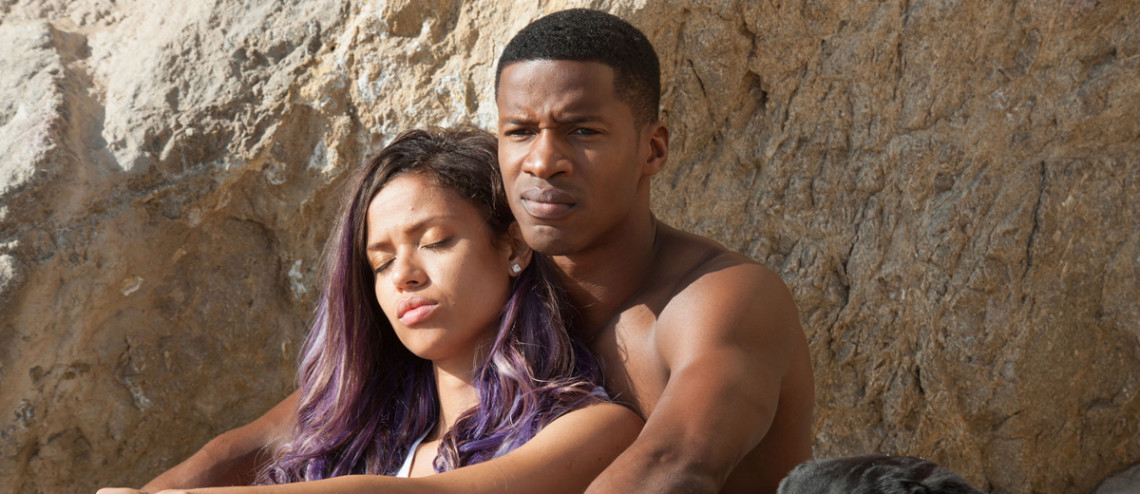Those who say all the stories have been told and that all that is left is to retell them in different ways fail to account for the fact that this is how new stories are made. If you strip it of its context, Beyond the Lights has been told before, a film about the pressures of fame and the possibility of escape with someone who exists outside the glass prison of wealth. (Written like that, it’s practically a Disney princess movie.) But as a romantic drama between two people of color, one of whom faces the existential artistic crises usually reserved for self-involved white men, it is by its very casting outside the norm. As such, even its clichés are rendered as new and unexpected.
Gugu Mbatha-Raw plays Noni Jean, a biracial kid raised by a determined single mother (Minnie Driver) into a world-class pop star styled after Rihanna and, as an A-lister with several gold records preceding an actual album, Nicki Minaj. Already, however, fame has become too much a burden for her to bear, and she attempts suicide after winning a Billboard Music Award, only to be saved by Kaz Nicol (Nate Parker), the L.A. cop assigned to watch her hotel room. As Noni struggles with her mental health, she and Kaz enter into an uneasy relationship scrutinized by seemingly the entire media.
Writer-director Gina Prince-Bythewood hones in on noxious celebrity gossip and the unbearable micromanagement of a famous person’s image. No sooner has Noni been pulled off the balcony than her mother sets up a press conference to dispel news of her child’s suicide attempt, and Noni regularly swallows her distaste to project an image of decadent carelessness to assuage the press, from the trail of paparazzi constantly around her up to national news anchors. (Don Lemon appears, hilariously, as his usual, trivial self). She has to so she can appease record executives, who sit on her sure-hit debut until the controversy blows over. “We’re selling fantasy, here, and suicide ain’t sexy,” says one suit, concerned about the woman only as far as it will affect the bottom line.
Kaz, too, lives under constant surveillance. As much groomed by his old man (Danny Glover) as Noni is by her mom, Kaz prepares to leap from the force to politics, and if he seems out of place among the fast-paced celebrity world, so too does Noni’s presence disrupt his chances for making the best impression to the right people, including an assembly of black evangelical leaders. Kaz’s accoutrements mimic the just-so details Noni must carry with her to stay in the spotlight, with copies of {Game Change} and photos of historical figures kept casually on display in his home so any reporter doing a feature on him will be tacitly urged to mention those knickknacks as proof of his commitment to a new line of work.
It bears repeating: seeing two people of color each grapple with their image is rare, and Prince-Bythewood also touches on how race factors into how they must present themselves. Noni has to use hair extensions to flatten her natural hair into something closer to the white pop starlet default, while Kaz has to look respectable to minority leaders who fret that he otherwise won’t win white voters. Scenes of the pair ducking photographers to eat soul food in their car by LAX, or running off to Mexico where Noni literally lets her hair down without all the extensions, wryly suggest that both of these people, primed for public life, effectively have to hide out to be black.
While the film effectively skewers the sickeningly intrusive culture celebrities must navigate, it stumbles badly in its critique of those celebrities. Noni’s sexualized performances are depicted as inherently demeaning, and Noni herself is portrayed as an artist with serious ambitions who is forced to pose topless and act lascivious on-stage to be a star. The film’s resolutely disgusted view with this aspect of modern pop imagery, peaking when Noni’s white rapper collaborator and on-off boyfriend (Machine Gun Kelly) effectively commits sexual assault live on-stage, makes victims of real-life pop stars who have openly squared sexualized performance with self-actualization and feminism. By refusing to entertain notions of contradiction and complexity in these personae, the film boxes itself into a corner in which Noni stages a comeback on her own terms by capitalizing on a viral video of her singing a Nina Simone song a cappella, a ludicrous development that cheapens the movie with its regressive utopian vision of “proper” pop.
Nonetheless, Beyond the Lights is often invigorating, and even when the plot heads onto shaky ground, the cast navigates with ease. Driver and Glover give their best performances in years as parents who know what it’s like to slave away alone and mix up their desires for their children’s success with their own drive to live a better, stabler life. Parker exudes tough-guy calm as Kaz, maintaining an even, frustrated tone over anger when his relationship hits bad spots. He speaks like a man who wants to make sure things work out, even if he’s prepared for it to end. But for the second time this year, Mbatha-Raw gives a star-making performance. If Noni is occasionally locked into a reductive role, the actress makes the most of Noni’s feelings of imprisonment, ably playing up insouciance to cameras while finding both freedom and turmoil away from prying eyes. The film may think that Noni’s conflicting desires must be resolved by stripping away a layer, but Mbatha-Raw proves she can juggle anything she’s given, and between this and Belle, she deserves the break-out Jessica Chastain got in 2011.





















One thought on ““Beyond the Lights””
Pingback: Beyond the Lights (2014) Watch Online Free | PutLocker.Pro